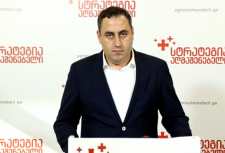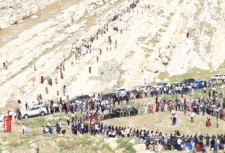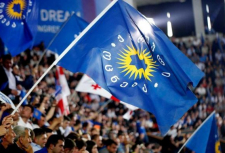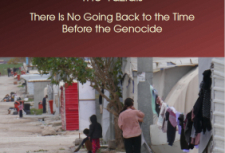UN Security Council on UNITAD adopted a resolution terminating the mandate of the UN Investigation Team to bring to justice for crimes committed by ISIS
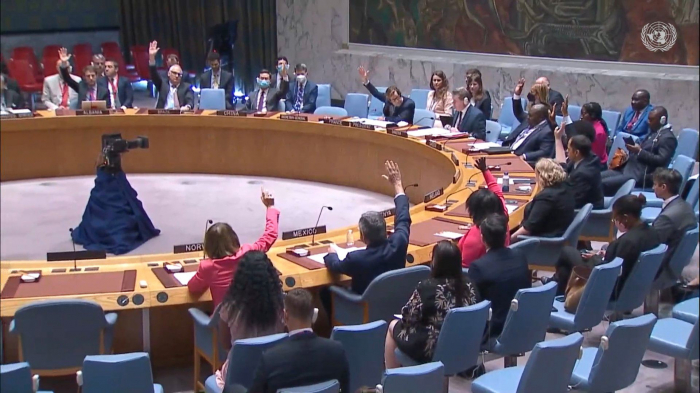
Statement from Nadia Murad and Barrister Amal Clooney
On 15 September 2023, at the request of the Government of Iraq, the UN Security Council took a step backwards in the pursuit for justice for ISIS by adopting resolution 2697 (2023). The resolution ends the mandate of United Nations Investigative Team to Promote Accountability for Crimes Committed by Da'esh/ISIL (UNITAD) in one year, on 17 September 2024. It also requests a report from the UN Secretary-General in January and a road-map for termination from UNITAD in March 2024.
This abrupt decision was taken without consultation with any ISIS survivors, despite the statement made on 12 September by a group of 48 international and Iraqi human rights groups that warned of the dangers of such a move and a similar statement by Nobel Laureate Nadia Murad and her counsel Amal Clooney on the same day.
UNITAD was created 5 years ago by the Security Council to ensure that evidence of ISIS’ crimes could be gathered on the ground in Iraq. It was clear at the time that this evidence-gathering was intended to be a first step, to be followed by prosecutions. At the Council session at which resolution 2379, creating UNITAD, was adopted, the representative of Sweden “welcomed the adoption of today's resolution, which is an important first step towards holding those responsible for the atrocities carried out by Daesh to account”. The ambassador of the US noted that “today's resolution is a … major first step towards addressing the ... crimes that include genocide”. France agreed that “this contribution by the Security Council to justice…. must serve as a first step”. And the UK, which held the pen on the draft, promised that although “bringing Daesh to justice will take time … patience and resolve”, justice should be delivered because “we owe it to those who have suffered to press ahead, however long the road might be”.
Yet in a session that took less than 20 minutes on Friday, the Security Council ended UNITAD’s mandate. Instead of clarifying how the evidence collected by UNITAD will now be used to prosecute ISIS for genocide and crimes against humanity, the Security Council has limited the prospects of justice. Comments by states after the vote highlighted that UNITAD has given survivors the ‘opportunity’ to provide their testimony – but what is the point in them doing so, sometimes at great risk, if it is not to be used to convict those responsible for abusing them?
UN Security Council resolution 2170 (2014), passed under Chapter VII of the UN Charter, calls on states to “bring to justice, in accordance with applicable international law, foreign terrorist fighters of, ISIL”. But the Council itself has now made it more difficult for them to do so. To date Germany’s courts have been the only ones to bring ISIS to justice for international crimes – including the only three trials anywhere in the world in which an ISIS fighter has been convicted of genocide. So far Iraq has not recognized the jurisdiction of the ICC nor reformed its laws to criminalize genocide, crimes against humanity or war crimes. Trials of ISIS figures in Iraq have been considered by the UN to violate international standards. And because Iraq applies the death penalty in such trials, UNITAD is prevented from sharing its evidence with Iraq under applicable UN rules. Survivors have also frequently shared their distrust in a purely national process.
The UN Secretary-General was requested “to submit to the Security Council, no later than 15 January 2024, a report setting out recommendations for implementing this request with full respect for the sovereignty of Iraq”. In our view, it is imperative that the UN make clear that:
·Survivors will be consulted, and their views taken into account in developing the report;
·Any evidence-sharing with Iraq will be in line with UNITAD’s Terms of Reference and applicable UN rules;
·Notwithstanding Iraq’s involvement in determining ‘modalities’ for evidence-sharing under the new resolution, cooperation with third states should continue in UNITAD’s final year in conformity with the terms of resolution 2379 and the Terms of Reference;
·Any evidence-sharing with any entity must fully respect the terms of the consent (or otherwise) provided by each victim or witness; and
·The UNSC should convene an urgent session in early 2024 to discuss the use of the evidence gathered by UNITAD including before an international court that can prosecute ISIL members for international crimes, as proposed by survivors and their counsel including in previous addresses to the Security Council.
It is regrettable that the Security Council has taken this step away from justice. The process can be salvaged – but only if states make this a priority.
Nadia Murad
Amal Clooney
Tags: #yazidisinfo #newsyazidis #UN #UNITAD #humanrights
UN Security Council on UNITAD adopted a resolution terminating the mandate of the UN Investigation Team to bring to justice for crimes committed by ISIS

Statement from Nadia Murad and Barrister Amal Clooney
On 15 September 2023, at the request of the Government of Iraq, the UN Security Council took a step backwards in the pursuit for justice for ISIS by adopting resolution 2697 (2023). The resolution ends the mandate of United Nations Investigative Team to Promote Accountability for Crimes Committed by Da'esh/ISIL (UNITAD) in one year, on 17 September 2024. It also requests a report from the UN Secretary-General in January and a road-map for termination from UNITAD in March 2024.
This abrupt decision was taken without consultation with any ISIS survivors, despite the statement made on 12 September by a group of 48 international and Iraqi human rights groups that warned of the dangers of such a move and a similar statement by Nobel Laureate Nadia Murad and her counsel Amal Clooney on the same day.
UNITAD was created 5 years ago by the Security Council to ensure that evidence of ISIS’ crimes could be gathered on the ground in Iraq. It was clear at the time that this evidence-gathering was intended to be a first step, to be followed by prosecutions. At the Council session at which resolution 2379, creating UNITAD, was adopted, the representative of Sweden “welcomed the adoption of today's resolution, which is an important first step towards holding those responsible for the atrocities carried out by Daesh to account”. The ambassador of the US noted that “today's resolution is a … major first step towards addressing the ... crimes that include genocide”. France agreed that “this contribution by the Security Council to justice…. must serve as a first step”. And the UK, which held the pen on the draft, promised that although “bringing Daesh to justice will take time … patience and resolve”, justice should be delivered because “we owe it to those who have suffered to press ahead, however long the road might be”.
Yet in a session that took less than 20 minutes on Friday, the Security Council ended UNITAD’s mandate. Instead of clarifying how the evidence collected by UNITAD will now be used to prosecute ISIS for genocide and crimes against humanity, the Security Council has limited the prospects of justice. Comments by states after the vote highlighted that UNITAD has given survivors the ‘opportunity’ to provide their testimony – but what is the point in them doing so, sometimes at great risk, if it is not to be used to convict those responsible for abusing them?
UN Security Council resolution 2170 (2014), passed under Chapter VII of the UN Charter, calls on states to “bring to justice, in accordance with applicable international law, foreign terrorist fighters of, ISIL”. But the Council itself has now made it more difficult for them to do so. To date Germany’s courts have been the only ones to bring ISIS to justice for international crimes – including the only three trials anywhere in the world in which an ISIS fighter has been convicted of genocide. So far Iraq has not recognized the jurisdiction of the ICC nor reformed its laws to criminalize genocide, crimes against humanity or war crimes. Trials of ISIS figures in Iraq have been considered by the UN to violate international standards. And because Iraq applies the death penalty in such trials, UNITAD is prevented from sharing its evidence with Iraq under applicable UN rules. Survivors have also frequently shared their distrust in a purely national process.
The UN Secretary-General was requested “to submit to the Security Council, no later than 15 January 2024, a report setting out recommendations for implementing this request with full respect for the sovereignty of Iraq”. In our view, it is imperative that the UN make clear that:
·Survivors will be consulted, and their views taken into account in developing the report;
·Any evidence-sharing with Iraq will be in line with UNITAD’s Terms of Reference and applicable UN rules;
·Notwithstanding Iraq’s involvement in determining ‘modalities’ for evidence-sharing under the new resolution, cooperation with third states should continue in UNITAD’s final year in conformity with the terms of resolution 2379 and the Terms of Reference;
·Any evidence-sharing with any entity must fully respect the terms of the consent (or otherwise) provided by each victim or witness; and
·The UNSC should convene an urgent session in early 2024 to discuss the use of the evidence gathered by UNITAD including before an international court that can prosecute ISIL members for international crimes, as proposed by survivors and their counsel including in previous addresses to the Security Council.
It is regrettable that the Security Council has taken this step away from justice. The process can be salvaged – but only if states make this a priority.
Nadia Murad
Amal Clooney
Tags: #yazidisinfo #newsyazidis #UN #UNITAD #humanrights

